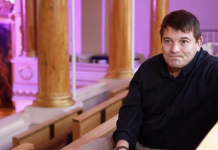A hymn echoes through the halls of St Paul’s Cathedral in Melbourne. There’s a funeral today, the nave filled with mourners. Above, in a private office, the city’s most senior Anglican is speaking about black holes, about singularities, and about God.
“You listen to cosmologists,” the Most Reverend Archbishop Dr Philip Freier tells me, “and they sound, in a way, very mystical.”
They have to, he says, because “despite having a Large Hadron Collider, they haven’t actually worked out how this thing happened yet.” He sweeps his hands, as though to encompass our interview, the church, the city, the galaxy. “There is much mystery in the universe.”
I’m in St Paul’s today to meet the Archbishop because, I have been told, he is both a person of God, and a person of science – he actually holds a science degree.
It’s the first time I’ve been to church in … 30 years, perhaps? And I feel somewhat underdressed. Freier is in full regalia. The fat purple jewel set into his ecclesiastical ring catches the afternoon sunlight.
He weaves together philosophy and history to tell a story of a society that has become poorer, less able to deal with new challenges, as it has become more secular.
We start with British empiricist A.J. Ayer, who argued that we can only know what we can see and sense and verify. Science has been unable to sense God, nor have anatomists found any sign of an immortal soul – and therefore, we should not believe in either.
That work “totally delegitimised” society’s ability to talk about moral philosophy, Freier argues. When World War II arrived, and science furnished us with new ways to kill and maim, we no longer had strong ethical principles to guide us, Freier argues. Atrocities ensued.
“That’s a great danger with a totally empiric system for understanding of the world,” Freier says.
Freier senses a growing social despair as we have embraced secularism. “The suicides, the people who find life is no longer meaningful, and oblivion is better than living,” he says.
“We have a rationalist argument – we attribute it to medical causes,” rather than asking: “Is there something more about human life that [once] made people’s lives meaningful?”
Tech-theorist Doug Rushkoff argues our tech-obsessed modern society has come to believe that technology can solve all our problems – like using geoengineering to solve the climate crisis. Freier points to the space tourism and escape fantasies of Elon Musk, Jeff Bezos and Richard Branson, who talk of saving the planet while their rockets punch holes in the ozone layer. “Madness,” says Freier. “I don’t think we’re applying an ethical grid over these things.”
God of the Gaps:
Freier does not see a conflict between science and faith. Science brings us new knowledge – Freier is no scriptural literalist – but cannot answer everything.
Read it all at Examine










